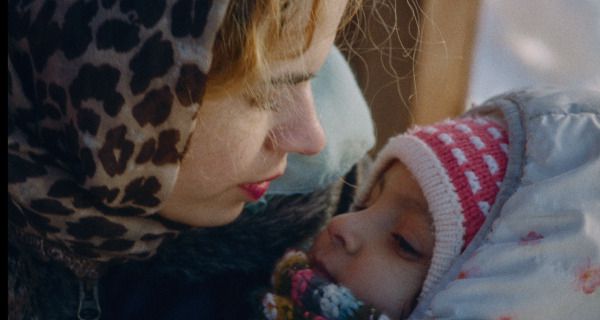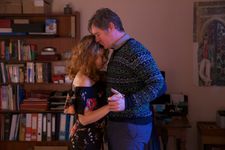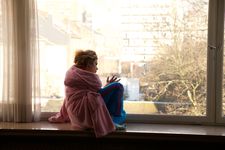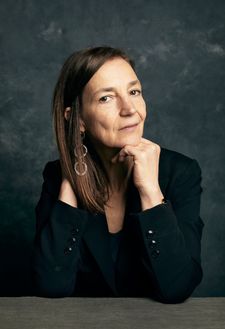 |
| Alina Serban and Rebecca Anghel in Alone At My Wedding. Marta Bergman: 'I wanted to make an emotional film. Emotions were really the driving theme while writing it' Photo: Jonathan Ricquebourg |
Bergman says that she doesn’t see a big difference between documentary and feature films.
“I think they are both connected,” she says, “I don’t see a clear line between them and both interfere with each other and I like the dialogue between documentary and fiction. It’s not such a strong dividing line. It’s loose and it’s interesting to work in a fiction way in documentaries and to work with a documentary approach in fiction. For me, it’s a continuity, not one and then another.”
The director admits she likes to people watch, a trait that is evidenced in the film, where small gestures – such as a mother swapping trays in a spice rack – speak volumes about the characters involved. Bergman says these small moments often came from her collaboration with her actors.
 |
| Alina Serban and Tom Vermeir as Pamela and Bruno. Marta Bergman: 'I remained open to actors’ proposals' Photo: Marina Obradovic |
Serban didn’t just bring her acting skill to the role of Pamela, she also brought her knowledge of Roma life as her mother, although she now, like the actress, lives in Bucharest is originally from the community where the film is shot.
Berman explains: “In the beginning, we were looking for a village. I wanted to shoot in the village where I shot my documentaries – Clejani – which is very well known for its musicians. We went there but very quickly we found it was not a good idea because people knew me too well and were too familiar.
“It was all the time, ‘Martha do this and give me that’, so we thought, it’s not a good plan at all. Alina said, ‘I know a village near Bucharest, my family comes from there and part of my family still lives there, so let’s go and visit them. So we went. It was a long time since she had seen them because she lives in Bucharest and she hadn’t seen them for quite a few years.
“They were very glad to meet us and they were very nice people and they helped us a lot. I think, without them, we couldn’t have made the film. The small girl, Rebecca, is the daughter of Alina’s mother’s cousin.” Rebecca is key to the success of the film but, given that the Romanian scenes are shot with feet of snow on the ground and the actors muffled up, did that make it difficult when filming with a child?
 |
| Marta Bergman on Pamela (Alina Serban): 'I really wanted to write about the journey of a heroine, of a strong character' Photo: Marina Obradovic |
Despite the cold setting, the Roma community and the characters in general are portrayed in a warm way, with the depiction a lot more nuanced than many films when it comes to talking about the various characters’ relationships and struggles.
“I really wanted to write about the journey of a heroine, of a strong character,” says Bergman “A Romanesque character. It’s rooted in reality, of course. I met a lot of girls like Pamela, who have a lot of aspirations and dreams. I don’t see them like Roma girls, I see them like girls, like people, first. They are just people like me and like you, so I just focus on the Roma character even though it’s there in the energy. People are complex, so in the writing an in the approach I tried to keep the complexity.”
And although the focus is firmly on Pamela’s experience, Bergman doesn’t demonise her internet ‘boyfriend’ Bruno.
 |
| Marta Bergman: 'I don’t see a clear line between them and both interfere with each other and I like the dialogue between documentary and fiction' Photo: Filip Van Roe |
Belgica star Vermeir (acting for the first time in French for the film) also brought extra help to the screenplay – not least in the incongruous selection of a piece of death metal to accompany a slow dance.
“We talked a lot about Bruno with Tom – he was very generous with this role – and we wondered what kind of music this man would like,” says Bergman. Tom said, ‘I have an idea, because it’s a group that I liked when I was a teenager and Bruno is a kind of a teenager.’ He came with this incredible music and we thought, ‘This great’. It’s scary.”
Music as a whole plays a key part in the film and Bergman says that she and her editor Frédéric Fichefet began working with the composer Vlaicu Golcea before they began shooting.
“We thought about a music that would express Pamela’s journey and emotions,” she says. “When I went to see Vlaicu, the composer, I thought he was the right person. I talked to him about the film and the story and he proposed several themes, Pamela’s themes even before he saw anything. He had the right feeling even without seeing anything, from our discussions. This is mysterious, what happens between people. So, while editing, we were sending him bits and pieces of the film and he composed from that, so we really worked together. And, at one moment, I thought I also want some real ‘roots’ village music, so I went back to the musician I know from Clejani and he interpreted the theme with the violin and the composer worked again putting all this together.”
Bergman didn’t want to talk in detail about her next project but did say that it will be another narrative film. She says: “Now I start to write a fiction again but also based on reality, I think I need reality to write.”





















